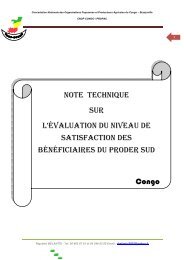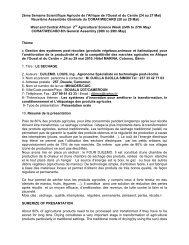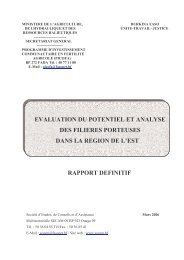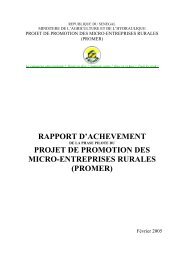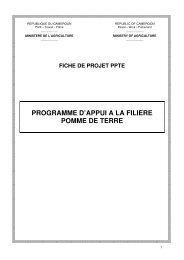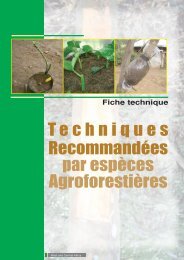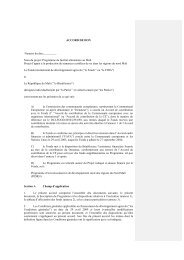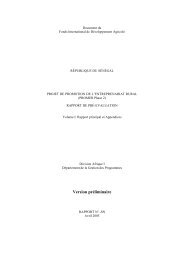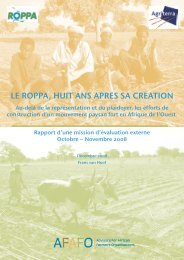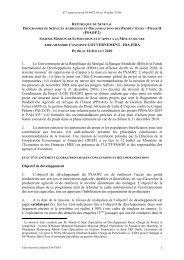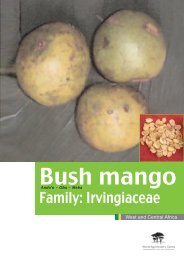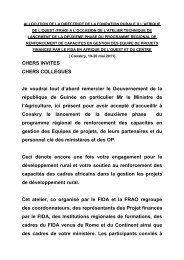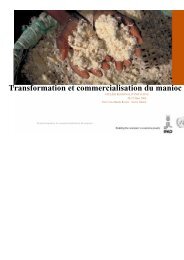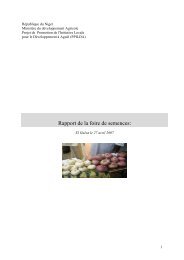Scaling Up the Fight Against Rural Poverty - FIDAfrique
Scaling Up the Fight Against Rural Poverty - FIDAfrique
Scaling Up the Fight Against Rural Poverty - FIDAfrique
Create successful ePaper yourself
Turn your PDF publications into a flip-book with our unique Google optimized e-Paper software.
that wants to support <strong>the</strong> scaling up of its successful interventions. We did not delve deeply into <strong>the</strong><br />
internal human resource and financial management policies and practices. This will have to be a<br />
separate effort as and when IFAD decides to move forward with a concerted effort to turn itself into a<br />
scaling up institution. Based mostly on interviews, this section considers <strong>the</strong> role and capacity of <strong>the</strong><br />
operational staff, especially <strong>the</strong> CPMs, discusses selected aspects of financial resource allocation, and<br />
finally highlights <strong>the</strong> importance of institutional values in creating an effective scaling up culture.<br />
1. Managing operational staff resources<br />
IFAD’s operational staff is organized in a single vice presidential unit, headed by <strong>the</strong> Associate Vice<br />
President and subdivided into five regional divisions and a technical and policy division. Virtually all<br />
of <strong>the</strong> operational work is carried out in <strong>the</strong> regional divisions and led by Country Program Managers<br />
(CPMs), many of whom have responsibility for more than one country. As previously noted CPMs are<br />
responsible for all aspects of IFAD’s country programs, from strategy formulation, project preparation,<br />
supervision and monitoring, to policy dialogue, stakeholder outreach, analytical work and knowledge<br />
management. They only have very limited staff to support <strong>the</strong>m in Rome and some support in those<br />
countries where IFAD has a local country presence. Few CPMs are as yet located in-country. As noted<br />
earlier, regional divisions have some technical capacity in <strong>the</strong> form of a regional economist, portfolio<br />
manager and/or knowledge manager. The technical and policy division is home to a limited number of<br />
technical experts in specific <strong>the</strong>matic areas, whose function is to provide technical guidance to <strong>the</strong><br />
CPMs, to design operational policies, to manage <strong>the</strong> review processes of COSOPs, project preparation<br />
and portfolio implementation, to allocate and monitor <strong>the</strong> use of grants and to assist <strong>the</strong> Associate Vice<br />
President and divisional directors in <strong>the</strong> overall management of <strong>the</strong> operational department.<br />
Two important functional and organizational changes have occurred since 2006 that have had a direct<br />
and positive impact on IFAD’s capacity to scale up:<br />
Direct Supervision: Until <strong>the</strong> mid 2000s, IFAD contracted out <strong>the</strong> supervision of its project. After<br />
some experimentation, it approved a new supervision policy in December 2006, which shifted IFAD’s<br />
focus to predominantly direct supervision. While <strong>the</strong> 2007 supervision policy paper did not refer<br />
specifically to scaling up as a reason for <strong>the</strong> policy change, key elements needed for effective scaling<br />
up are supported by direct supervision. 41 Since <strong>the</strong> adoption of <strong>the</strong> new supervision policy, IFAD has<br />
systematically and effectively moved to direct supervision, with new guidelines, staff training, and<br />
evaluation of progress. In Africa, for example, IFAD moved from less than 5% of projects subject to<br />
direct supervision to more than 90%. 42 Maintaining this approach, and ensuring that supervision<br />
explicitly focuses on scaling up, should remain a priority for IFAD.<br />
Field Presence: In 2003 IFAD initiated an experimental program to establish increased field presence.<br />
This pilot was evaluated in 2007. Based on an overall positive experience, <strong>the</strong> decision was made to<br />
systematically increase IFAD’s field presence. As a result <strong>the</strong>re have been rapid increases in <strong>the</strong><br />
number of IFAD country offices. In Africa, for example, <strong>the</strong> number of such offices increased from<br />
two in 2003 to 17 in 2008. 43 An evaluation report noted that while <strong>the</strong> pilot was not specifically<br />
designed to support innovation and scaling up, it did have clear positive impacts in this regard. IFAD<br />
can build this positive experience, especially as regards <strong>the</strong> placement of more CPMs in-country.<br />
While <strong>the</strong>re are costs – financial and managerial – to doing so, country presence of <strong>the</strong> CPM will<br />
41 IFAD, “Supervision and Implementation Support Policy”, Rome, September 2007, p.6<br />
42 AfDB-IFAD, “Towards Purposeful Partnerships in African Agriculture: A Joint Evaluation of <strong>the</strong><br />
Agriculture and <strong>Rural</strong> Development Policies and Operations in Africa of <strong>the</strong> African Development Bank and<br />
<strong>the</strong> International Fund for Agricultural Development.” 1 December 2009, p. 80.<br />
43 Ibid, p. 80.<br />
43



